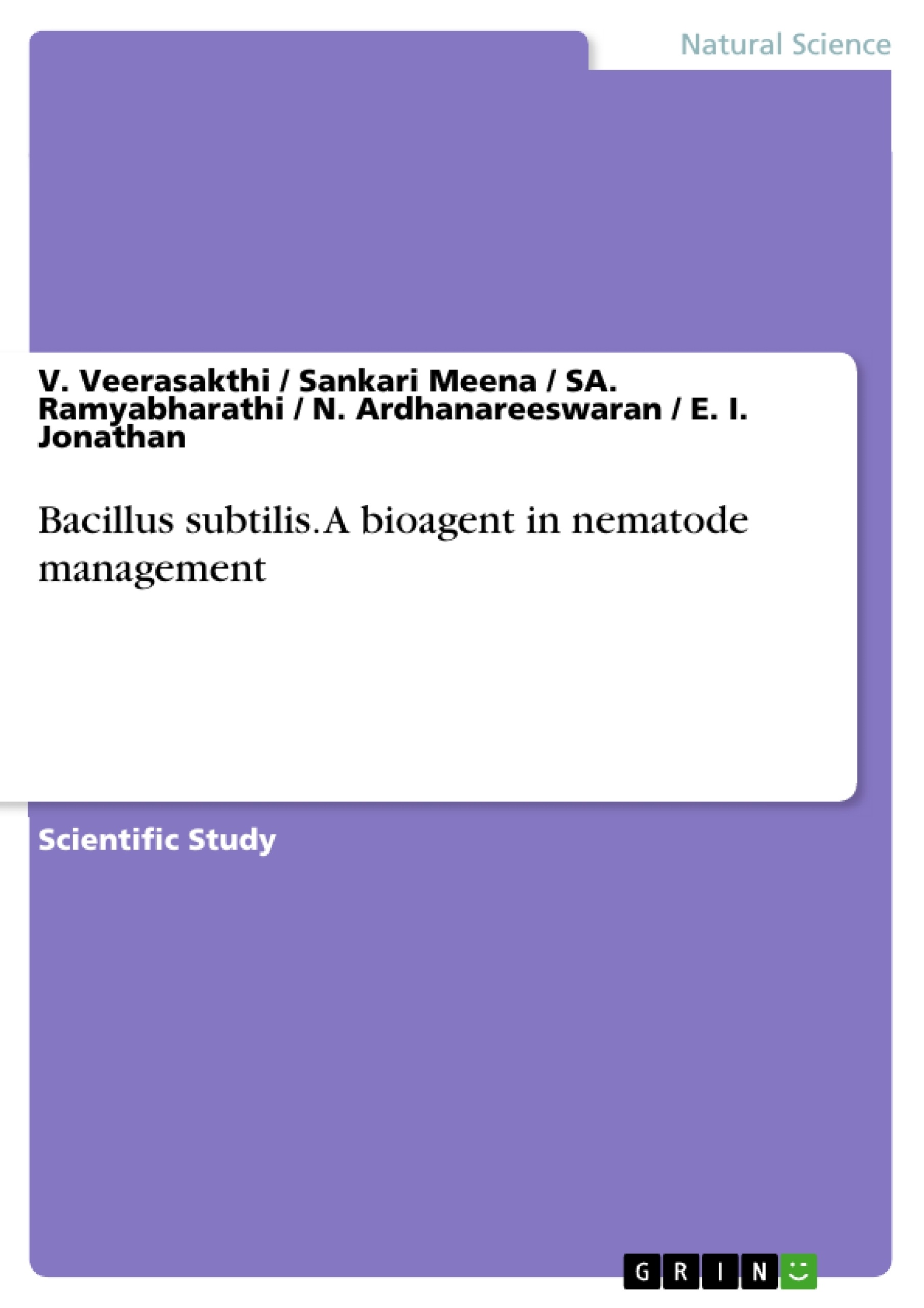Root knot nematode, Meloidogyne incognita, is an important nematode parasite of tuberose. A study was undertaken to assess the evaluation of plant growth promoting rhizobacteria (PGPR) against Meloidogyne incognita infestation on tuberose in vitro, pot culture and field conditions.
Tuberose fields were surveyed for the nematode incidence in different districts of Tamil Nadu. Among the nematodes associated with the crop M. incognita caused severe damage to crop.
Plant growth promoting rhizobacteria were isolated from soil samples collected from field and subcultured for further studies. The isolates were tested for their efficacy for plant growth promotion by roll towel and pot culture studies with rice plants. Among them, three isolates, viz. BT3, BT8 and BT21 were found to be effective in increasing the plant growth promotion when compared to other isolates.
Biochemical characterization of the isolates revealed that the cultures were found to be the group of Bacillus spp. Liquid formulation were prepared for the three isolates with nutrient amendments, viz. glycerol (10 Mm), trehalose (5 mM) and the stickers, viz. starch (2%) and PVP (2%) and the antagonistic effect of different Bacillus isolates were studied against M. incognita in vitro. Effect of liquid formulation of the Bacillus strains were tested against M. incognita under greenhouse and field condition. Histopathological studies were carried out for the B. subtilis treated and untreated plants.
Inhaltsverzeichnis (Table of Contents)
- Introduction
- PGPR in nematode management
- Diversity of Bacillus
- Biocontrol potential of Bacillus on nematodes
- Isolation and characterization of Bacillus subtilis
- Bacillus subtilis in nematode management
- Overview
Zielsetzung und Themenschwerpunkte (Objectives and Key Themes)
This study investigates the effectiveness of native antagonistic Bacillus spp. against root knot nematode infestations in tuberose. The main objective is to develop a sustainable, ecofriendly, and economically feasible method for managing nematodes in tuberose cultivation. The study encompasses several key steps: surveying and identifying the level of nematode infestation in tuberose across different regions of Tamil Nadu, isolating native Bacillus strains, characterizing these isolates, evaluating their in vitro efficacy against the root knot nematode M. incognita, preparing effective aqueous formulations of the selected Bacillus isolates, and assessing their effectiveness against root knot nematodes under both pot culture and field conditions. The study also aims to visualize the histopathological changes in tuberose roots due to the interaction between nematodes and Bacillus and to explore the induction of plant defense mechanisms in response to the biocontrol agent.
- Nematode management in tuberose cultivation
- Biocontrol potential of Bacillus spp. against root knot nematodes
- Isolation and characterization of native Bacillus isolates
- Efficacy of Bacillus formulations against root knot nematodes in pot culture and field conditions
- Histopathological changes in tuberose roots due to nematode-Bacillus interaction
Zusammenfassung der Kapitel (Chapter Summaries)
The first chapter provides a general overview of the challenges posed by root knot nematodes in tuberose cultivation, highlighting the economic importance of tuberose and the limitations of chemical nematicides. Chapter two focuses on the role of Plant Growth Promoting Rhizobacteria (PGPR) in nematode management, emphasizing their ecofriendly and economically viable nature. This chapter delves into the benefits of using PGPR as biocontrol agents and their effectiveness against endoparasitic and semi-endoparasitic nematodes. Chapter three provides a detailed overview of the diversity of Bacillus species, while Chapter four focuses on the biocontrol potential of Bacillus against nematodes. Chapter five describes the process of isolating and characterizing Bacillus subtilis strains. Chapter six discusses the specific role of Bacillus subtilis in managing nematodes, providing insights into the mechanisms by which Bacillus subtilis exerts its biocontrol effects. Finally, chapter seven offers a comprehensive overview of the study's findings and conclusions, highlighting the importance of Bacillus subtilis as a promising biocontrol agent for sustainable tuberose production.
Schlüsselwörter (Keywords)
The primary focus of this research is on the use of Bacillus subtilis as a biocontrol agent against root knot nematodes, specifically Meloidogyne incognita, in tuberose cultivation. Key areas of exploration include the isolation and characterization of native Bacillus strains, the development of effective bioformulations, and the evaluation of their efficacy in pot culture and field conditions. The study further investigates the histopathological changes in tuberose roots due to nematode-Bacillus interactions and the induction of plant defense mechanisms in response to the biocontrol agent.
- Citation du texte
- V. Veerasakthi (Auteur), Sankari Meena (Auteur), SA. Ramyabharathi (Auteur), N. Ardhanareeswaran (Auteur), E. I. Jonathan (Auteur), 2014, Bacillus subtilis. A bioagent in nematode management, Munich, GRIN Verlag, https://www.grin.com/document/284615




